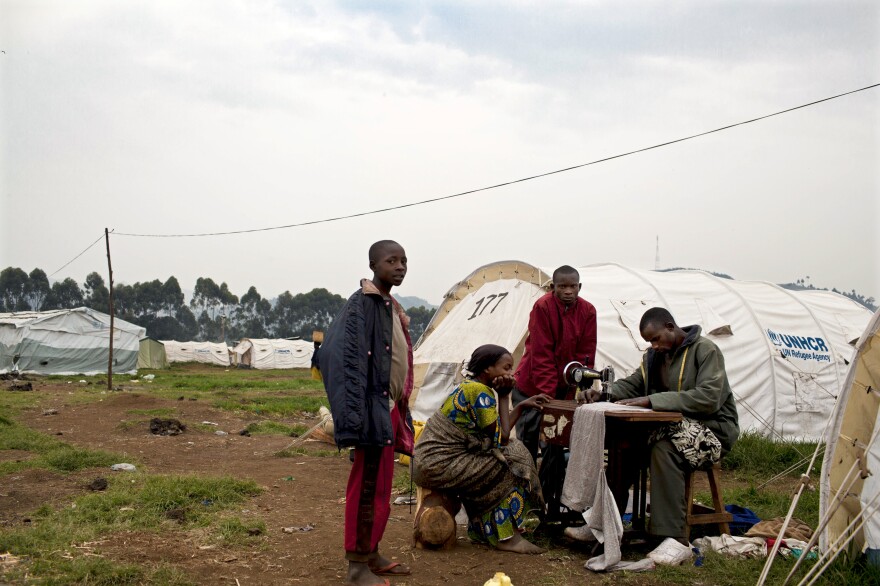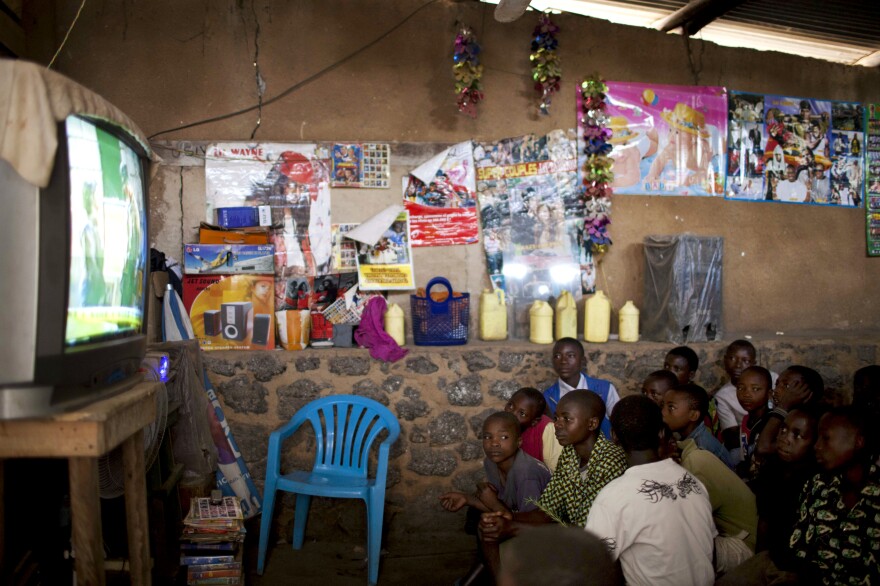For years, armed militias have been stalking the lush forests in the eastern part of the Democratic Republic of Congo, committing all sorts of atrocities against villagers. And now one of the most war-ravaged countries in the world has another looming problem: an emerging rebel group.
"A notorious group of human rights violators" is how the U.N. human rights commissioner describes the group, known as the March 23 Movement, or M23.
Reportedly led by a Tutsi warlord wanted by the International Criminal Court, M23 has been accused of rape, murder and child-soldier recruitment.
The group controls a chunk of eastern Congo larger than Delaware that's full of clear plunging rivers, endless arbors of banana plants and desperately poor villagers. The U.N. accuses neighboring Rwanda of backing the rebels, a charge Rwanda denies.

Seeking A New Image
The M23 is working hard to create a kinder, gentler image of itself through a website, daily press releases and invitations to journalists to come see for themselves.
On a Sunday morning, a Catholic congregation sings hosannas, while militiamen shouldering assault rifles and an oboe-shaped grenade launcher patrol the main street of Rutshuru, a town near the borders of Congo, Rwanda and Uganda.
The rebels are trying to show that they can administer this and other settlements in neglected North Kivu Province better than the central government in Kinshasa, which is far away on the western side of the huge country.
"When you look at the whole of [Congo], there are high [levels] of corruption, no proper leadership, no proper governance of people," says M23's spokesman Vianney Kazarama.
"In this territory they've taken, they want to stop issues of corruption, they want to govern the people within the law, that's what they're intending to do," Kazarama says.
But many are skeptical of such claims.
Similarities To Previous Rebel Group
M23 is made up of soldiers and officers who deserted the Congolese Army earlier this year over a variety of grievances.
Human rights investigators say the insurgents are a retread of an earlier rebel band that operated in this same sector a few years ago. They extorted shopkeepers, abused civilians and answered to Gen. Bosco "the Terminator" Ntaganda — a fugitive who's wanted for war crimes by the International Criminal Court.
Kazarama vehemently denies Ntaganda is the rebels' commander.

What do the residents of the region say about M23?
It depends on where you talk to them.
A stationery shop owner named Emanuel on Rutshuru's main street says in the month since M23 took over, the rebels have repaired the town water tank and its generator. A half-dozen store owners interviewed said the rebels are not mistreating people.
But the story is rather different in a transit camp across the border in Uganda run by the U.N. High Commission for Refugees. Forty-thousand people fleeing North Kivu have passed through.
Evacuees sleep in big white tents. They cook pots of corn mush on firepits of volcanic rocks. And to a person, they condemn M23.
A group of young men say they ran away because M23 forcibly recruits fighting-age youths into its ranks. One shows the identify card of his dead older brother and says he was shot in the head when he ran.
A short distance away, a fleshy woman in a blue headscarf named Nyira speaks up.
"They go to a man's home and ask him for money, and if he does not have it, they beat him up and rape the woman. That's what they do," she says.
A Ravaged Region
The weary villagers of eastern Congo have a long history of abusive treatment.
From 1998 to 2003, the country descended into a civil war in which nine African nations and some 20 armed groups fought each other.
The war is believed to have killed millions, not just from fighting, but from disease and malnutrition. Despite a peace accord in 2003, the conflict never really ended in the east.
The fear today is that the emergence of the M23 will reignite a wider regional conflict.
Frederick Golooba, a Ugandan political scientist with expertise in the African Great Lakes region, says it's simplistic to say M23 is motivated by power and brigandry.
"The M23, at least from the claims they make, and this is backed up by some historical evidence, are motivated by a desire to protect their community," he says. "Because they are Tutsis."
Much of the violence that continues to convulse eastern Congo has its roots in Tutsi-Hutu hatred that led to the Rwandan genocide in 1994.
M23's command is largely composed of Tutsi officers who seized this territory to protect the interests of their ethnic group, says Jason Stearns, an author and analyst who studies armed groups in the region.
"But certainly in private, they're telling people the only way we can maintain our interests — economic, political and security — is to have our own country," he says.
Despite its public relations, M23 will have a hard time building international sympathy for an autonomous Tutsi state within the DRC. Human Rights Watch is releasing a report on M23 that documents cases of civilian executions, rape and torture — mainly against Hutus.
What's more, the U.N. reports that M23 has made alliances with other renegade militias far outside of its territory to create a united rebel front against the Congolese government.
Regional security ministers are meeting in Uganda this week to decide a course of action to try to avert a widening war in eastern Congo.
Copyright 2021 NPR. To see more, visit https://www.npr.org. 9(MDAxNzg0MDExMDEyMTYyMjc1MDE3NGVmMw004))








